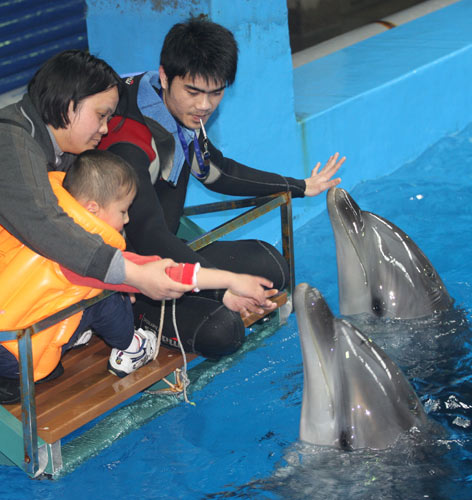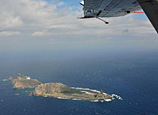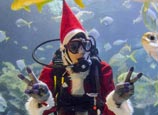
 |
| Dolphins help children open up just by simply playing with them. (Photo Source: China Daily/Li Bo) |
Most proponents agree on the merit of the fun factor. Some also claim it boosts people's immune systems.
And many experts contend the therapy's benefits run deeper.
Dolphins' presence palpably changes water. Those who swim with the creatures report fizzing sounds, as if the marine mammals carbonate the water. The sound has been compared to popcorn, flames and sparklers.
The marine animals' ultrasonic energy is four times more powerful than scientific instruments used to peer inside the body to make diagnoses, monitor pregnancies and break down kidney stones, gallstones and cataract-clouded lenses.
This is amplified by the water, which transmits sounds at 60 times air's efficiency. The ultrasonic energy then enters our bodies - which are, in turn, mostly water. But how - and if - this helps children with mental disabilities remains unclear.
Preliminary tests by the AquaThought Foundation suggest human brainwaves change when they interact with dolphins. One theory says the two species' frequencies sync during interactions.
AquaThought researchers report shifts in neural oscillations among people who interact with the marine mammals. Their studies have measured switches from the beta state of everyday consciousness, to the alpha state that is typical of relaxed closed-eyed wakefulness. Subjects sometimes also slip into the meditative theta state, the results find.
The foundation also measured increased synchronization between the brain's hemispheres, which is linked to enhanced learning and cognizance.
Western therapists have for decades used dolphins to treat children with autism, Down syndrome, cerebral palsy and other neurological disorders.
China has only recently started experimenting with dolphin-swims, among other forms of animal-assisted therapy.
But a lack of scientific affirmation of the treatments' effectiveness isn't the sole source of opposition.
Animal rights advocates oppose the practice.
Marketing director of Shanghai's Changfeng Park Ocean World Xu Jie says the aquarium nixed its dolphin-swim therapy program when British operator Merlin Entertainments invested in the park last year.
"They really value animal rights," Xu says. "They believed it was too much to have the dolphins work as both healers and performers."
That's why Hangzhou Polar Ocean Park has designated two of its 15 dolphins solely for therapy.
"It would be too much for them to both perform and provide therapy," Liu says."The dolphins might feel stress and could even hurt the children."
Each dolphin only sees two or three children a day.
The treatments cost 2,300 yuan ($370) for 15 sessions, given every other day over a month.
Zheng believes it's money well spent.
Whether dolphin-assisted therapy is science or pseudoscience - or something else entirely - the father says his son's progress is the only proof he needs that it works.















 Residential building collapses in E China's Ningbo
Residential building collapses in E China's Ningbo


![]()
